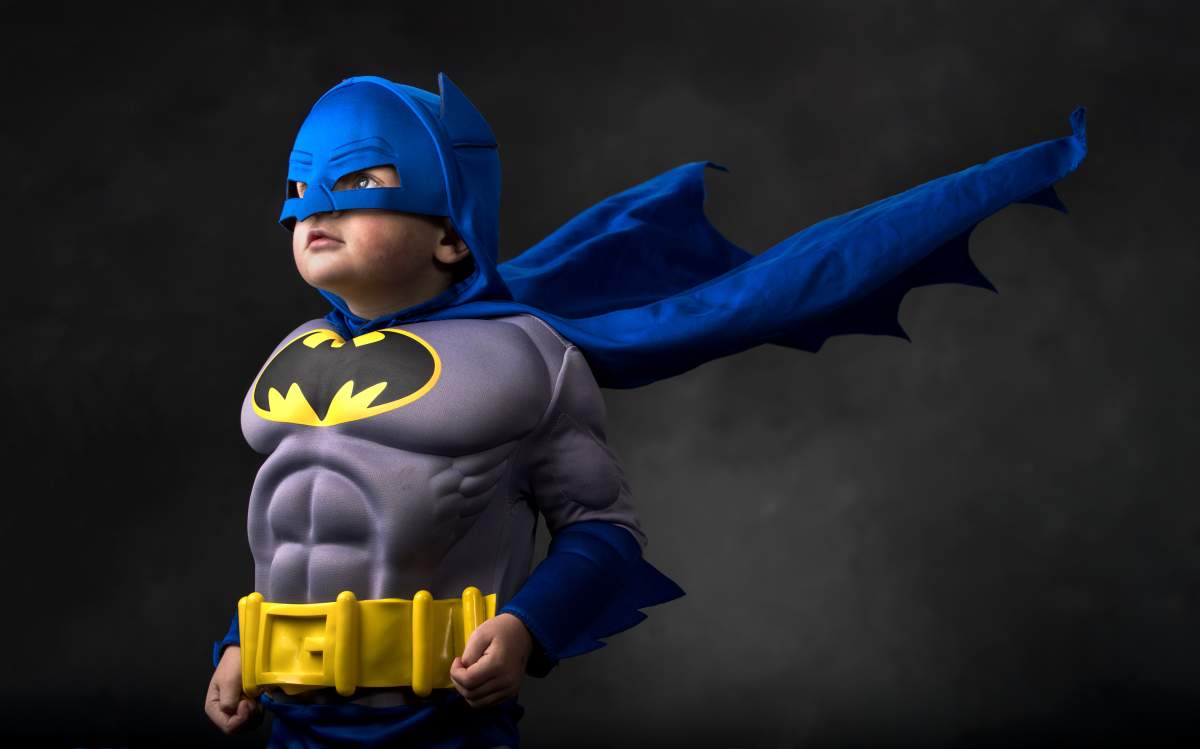Superheroes are brave defenders of justice but are your kids too distracted by Captain America’s superhuman strength or Iron Man’s gadgets?

Young boys may be picking up on their favourite superhero’s power and aggressiveness while ignoring their positive traits like standing up for the weak and helping others, a new study is warning.
The research, out of Brigham Young University, suggests that preschool-aged boys who take in more of the superhero culture end up more physically and relationally aggressive as they get older. Watching Batman and Spiderman didn’t make the kids less likely to defend their classmates being bullied.
READ MORE: Here’s how Disney princesses are influencing your daughter – and son, too
“Kids into superhero culture were more aggressive within the next year, suggesting they’re learning from the media,” study author Dr. Sarah Coyne, a family life professor, told Global News.
“They’re not more likely to defend people being victimized. I was hoping to find that because that’s what I hypothesized. We see these heroic acts so much in superhero culture but the kids aren’t taking away that message,” she said.
Last year, Coyne did a study on what little girls were learning from Disney princesses. In that case, she learned that Disney princesses could be exposing kids to “damaging stereotypes.” While Elsa, from Disney’s wildly popular film Frozen, croons about loving herself, including her flaws, little girls zeroed in on her shiny, long hair, tiny waist and soft-spoken voice.
Little boys, on the other hand, ended up with better feelings about their bodies and were, generally, more helpful to others the more they interacted with Disney princesses through movies and toys.

Get weekly health news
READ MORE: LeBron James, Peyton Manning food endorsements ‘sending mixed messages’ to kids
Coyne is a mother of three boys and a daughter all under 12 years old. She has another baby boy – her fourth – due next week.
This time around, she wanted to study superheroes and how they affected kids’ behaviour.
Working with 240 preschool-aged kids and their parents, Coyne interviewed the families about how often their sons were watching superhero movies and cartoons, playing with toys or reading comics.
The parents were asked about their kids’ behaviour in the following year. They were also asked how they felt about superhero culture while their kids were asked what they liked about their favourite superheroes.
Coyne learned that the more boys were exposed to superhero culture, the more likely they were to display “physical aggression,” from hitting, kicking, pushing or throwing things at others. They also displayed more “relational aggression,” such as bullying or excluding their peers.
READ MORE: Want your daughter to break barriers? Dads should do chores, study suggests
Coyne’s guess is that preschoolers are too young to understand what the underlying message is from the superheroes they look up to.
“They pick up on the violence because it’s flashy and exciting. It’s harder for them to pull out the wider message. They can’t grasp it enough at this age,” she said.
Most cartoons and films starring superheroes aren’t meant for preschool-aged kids anyway, she notes. Yet many families will watch The Avengers movies together or parents will let their toddlers watch a Saturday morning cartoon that isn’t for their kids’ age group.
“I wouldn’t say ban superhero culture – it can be a fun part of childhood. I suggest avoiding the superhero media that’s not aimed toward preschoolers because they’re just not ready for it,” she said.
READ MORE: Teens’ drinking habits influenced by Hollywood movies: study
And once kids are old enough for the content, watch the program with them and talk to your kids about the positive aspects. While Spiderman may be strong and fights the bad guys, he’s defending others, is kind and humble and is helping others, Coyne said as an example.
Alyson Schafer, a Canadian parenting expert and author, said that parents can take it to the next level by talking to their kids about other ways to resolve conflict, too.
Captain America may have turned to violence but could he have considered talking to the person or making a compromise?
“I am never OK with people punching others in the face. Fill in the blanks of what kids are missing – just because somebody did something wrong, it doesn’t mean that you have to hurt them,” Schafer said.
Read more: Alcohol advertising linked to ‘increased’ drinking in adolescent girls, Canadian doctor warns
You can’t assume your kids are interpreting a TV show or movie the same way that you are.
“Parents watch it and get the moral message but kids don’t. Parents need to be an active component of media screening,” Schafer said.
For her next steps, Coyne wants to follow-up with the children in her study. Right now, they’re about 10 years old.
“There really are some positive messages in superhero culture. Maybe we don’t see it come out until later in adolescence,” she said.
Her latest findings were published this week in the Journal of Abnormal Child Psychology.
carmen.chai@globalnews.ca
Follow @Carmen_Chai










Comments
Want to discuss? Please read our Commenting Policy first.